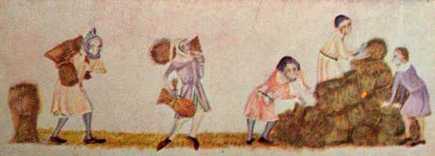Making hay while the sun shines
Carpe Diem. Seize the day. Summer's lease hath all too short a date.
When lofty trees I see barren of leaves,
Which erst from heat did canopy the herd,
And summer's green, all girded up in sheaves,
Born on the bier with white and bristly beard;
Then of thy beauty do I question make,
That thou among the wastes of time must go,
Since sweets and beauties do themselves forsake,
And die as fast as they see others grow. . .
(Sonnet 12, to the Young Man)
Summer's orderly bees...
In Henry V, the Archbishop of Canterbury argues that human society is like a hive of bees: (1.2.188-94)
". . . Creatures that by a rule in nature teach
The act of order to a peopled kingdom.
They have a king, and officers of sorts,
Where some like magistrates correct at home,
Others like merchants venture trade abroad,
Others like soldiers armèd in their stings
Make boot upon the summer's velvet buds. . ."
Footnotes
-
Bees and farming
Compare Gervase Markham's comments in a treatise on farming:
Of all the creatures which are behoveful for the use of man, there is none more necessary, wholesome, or more profitable than the bee, nor any less troublesome, or less chargeable.
To speak then first of the nature of bees, it is a creature gentle, loving, & familiar about the man, which hath the ordering of them, so he come neat, sweet, and cleanly amongst them: otherwise, if he have strong, and ill-smelling favours about him, they are curst and malicious, and will sting spitefully: they are exceeding industrious and much given to labour, they have a kind of government amongst themselves, as it were a well ordered commonwealth: every one obeying and following their king or commander, whose voice (if you lay your ear to the hive) you shall distinguish from the rest, being louder and greater, and beating with a more solemn measure.From Gervase Markham, A Way to Get Wealth (1632).
